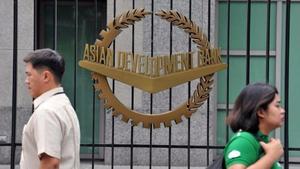 Pedestrians walk past a logo of the Asian Development Bank displayed outside its headquarters in Manila, Philippines on Sept 2, 2010. (PHOTO / AFP)
Pedestrians walk past a logo of the Asian Development Bank displayed outside its headquarters in Manila, Philippines on Sept 2, 2010. (PHOTO / AFP)
HONG KONG – Developing Asia will need to invest $13.8 trillion in infrastructure by 2030, with private sector funding vital to that figure, according to a report by the Asian Development Bank published on Tuesday.
According to the ADB, the developing Asia economies will need $1.7 trillion in annual infrastructure investment from 2023 to 2030 to sustain economic growth, reduce poverty, and combat climate change.
Developing Asia comprises the 46 ADB members in the Asia-Pacific.
For ASEAN economies, the total infrastructure investment needed is estimated to be at least $2.8 trillion over the same period.
ALSO READ: IMF raises Asia's economic forecast on China recovery
The report was launched in partnership with the finance ministers and central bank governors of the Association of Southeast Asian Nations Plus Three (ASEAN+3) on the opening day of the ADB’s 56th Annual Meeting in Incheon, west of South Korea’s capital Seoul. The four-day meeting had the theme: “Rebounding Asia: Recover, Reconnect, and Reform”.
Innovative financing mechanisms are needed to attract private and institutional capital—along with public funds—to fund critical infrastructure that will create jobs and generate revenue for local economies.
Woochong Um, Managing Director General, ADB
The ASEAN+3 comprises the 10 members of ASEAN plus China, Japan, and South Korea.
Though 92 percent of public and social infrastructure development in Southeast Asia has traditionally been financed by public resources, the ADB said this was insufficient to bridge the widening deficit between the requirements and mobilized capital.
The ADB said private sector participation is key to narrowing the infrastructure financing gap critical for economies to meet their economic and social goals
Noting more than $200 trillion of private capital is invested in global capital markets, the ADB said innovative finance mechanisms are needed to catalyze private and institutional funding for infrastructure and to scale up to meet the growing needs of the region as ASEAN+3 economies bounce back from the pandemic.
“Innovative financing mechanisms are needed to attract private and institutional capital—along with public funds—to fund critical infrastructure that will create jobs and generate revenue for local economies,” said ADB Managing Director General Woochong Um.
Innovative finance mechanisms can be defined as new and evolving models, beyond commercial debt finance, that can attract private and institutional capital, along with public funds, for developmental activities.
“A conducive policy and regulatory framework must be built to reduce risk, offer credit enhancements and de-risking facilities, and provide investment opportunities for all stakeholders to collaborate,” said Um.
“Raising investor awareness of innovative financing approaches will be key to encourage greater investments in marginally bankable projects,” said Singapore’s Minister in the Prime Minister’s Office Indranee Rajah.
Rajah, who is also second minister for finance and national development, said the critical success factors from actual case studies in the report provide useful lessons for governments seeking to apply such financing approaches in their respective economies.
READ MORE: ASEAN must strengthen position in global value chains, says ADB
The ADB forecasted that Southeast Asia’s GDP will grow by 4.7 percent in 2023 and 5 percent in 2024, higher than the GDP growth rates of most developed world economies. It also said it expects China’s economy to grow 5 and 4.5 percent in 2023 and 2024, respectively.
With China’s reopening and the abatement of inflationary pressures, Asia is poised to be the growth engine of the global economy by increasing its share of global GDP from over 45 percent to over 50 percent by 2030, the ADB report said.
Contact the writer at kelly@chinadailyapac.com


